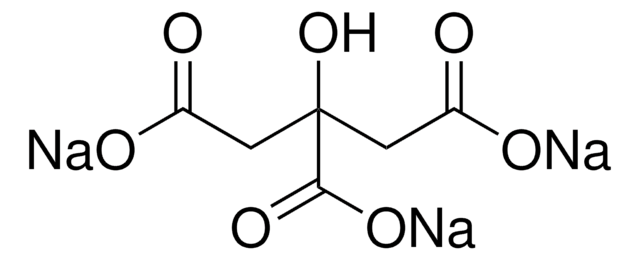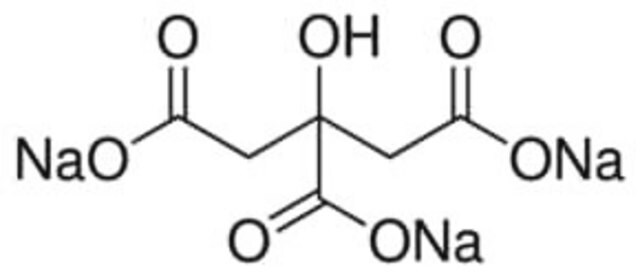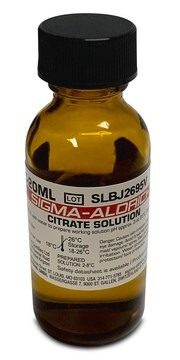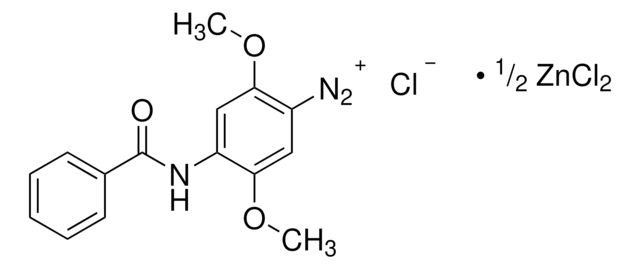S5770
Citrate Concentrated Solution
BioReagent, suitable for coagulation assays, 4 % (w/v)
Synonym(s):
Sodium citrate solution
Sign Into View Organizational & Contract Pricing
All Photos(1)
About This Item
Empirical Formula (Hill Notation):
C6H5Na3O7
CAS Number:
Molecular Weight:
258.07
MDL number:
UNSPSC Code:
12161700
PubChem Substance ID:
NACRES:
NA.25
Recommended Products
sterility
aseptically filled
Quality Level
product line
BioReagent
form
liquid
concentration
4 % (w/v)
suitability
suitable for coagulation assays
storage temp.
2-8°C
SMILES string
[Na+].[Na+].[Na+].OC(CC([O-])=O)(CC([O-])=O)C([O-])=O
InChI
1S/C6H8O7.3Na/c7-3(8)1-6(13,5(11)12)2-4(9)10;;;/h13H,1-2H2,(H,7,8)(H,9,10)(H,11,12);;;/q;3*+1/p-3
InChI key
HRXKRNGNAMMEHJ-UHFFFAOYSA-K
Looking for similar products? Visit Product Comparison Guide
Application
Citrate Concentrated Solution has been used to prevent coagulation of the blood sample used for hemograms. It has also been used to analyze the effect of its anticoagulant action on clumping, using platelet-rich plasma (PRP).
Biochem/physiol Actions
Citrate Concentrated Solution or sodium citrate is an anticoagulant used for collecting blood samples. It is useful in coagulation testing and for the erythrocyte sedimentation rate. Sodium citrate eliminates calcium, which is known to mediate coagulation.
Storage Class Code
10 - Combustible liquids
WGK
WGK 1
Flash Point(F)
Not applicable
Flash Point(C)
Not applicable
Choose from one of the most recent versions:
Already Own This Product?
Find documentation for the products that you have recently purchased in the Document Library.
Customers Also Viewed
Febrile, Allergic, and Other Noninfectious Transfusion Reactions
Blood Banking and Transfusion Medicine, 677-690 (2007)
Dong Hyun Jo et al.
Oncotarget, 5(22), 11513-11525 (2014-11-02)
Retinoblastoma, the most common intraocular malignant tumor in children, is characterized by the loss of both functional alleles of RB1 gene, which however alone cannot maintain malignant characteristics of retinoblastoma cells. Nevertheless, the investigation of other molecular aberrations such as
Lingyan Xing et al.
The Journal of neuroscience : the official journal of the Society for Neuroscience, 35(44), 14794-14808 (2015-11-06)
Modulation of connectivity formation in the developing brain in response to external stimuli is poorly understood. Here, we show that the raphe nucleus and its serotonergic projections regulate pathfinding of commissural axons in zebrafish. We found that the raphe neurons
Dhiraj Kumar et al.
PloS one, 9(10), e110482-e110482 (2014-10-21)
Bisphenol-A (BPA), a well known endocrine disruptor, impairs learning and memory in rodents. However, the underlying molecular mechanism of BPA induced impairment in learning and memory is not well known. As synaptic plasticity is the cellular basis of memory, the
Yosuke Funato et al.
The Journal of clinical investigation, 124(12), 5398-5410 (2014-10-28)
Intracellular Mg(2+) levels are strictly regulated; however, the biological importance of intracellular Mg(2+) levels and the pathways that regulate them remain poorly understood. Here, we determined that intracellular Mg(2+) is important in regulating both energy metabolism and tumor progression. We
Our team of scientists has experience in all areas of research including Life Science, Material Science, Chemical Synthesis, Chromatography, Analytical and many others.
Contact Technical Service







